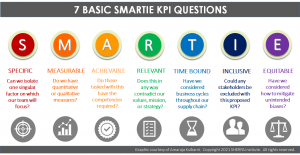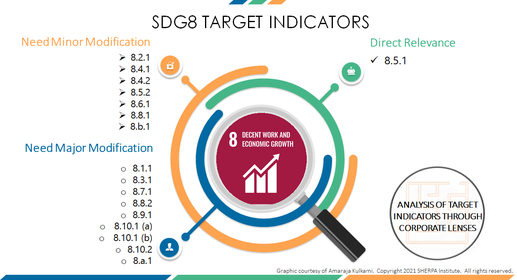Thank you for showing interest in SDG8. With your help we know we can achieve a difference when it comes to productive employment and decent work for the world’s 7 billion plus people. Join us as we talk about indicator relevance and indicator framework.
SDG8 includes twelve targets and seventeen indicators. Of note, you may notice eighteen indicators, however; 8.9.2 was removed as a tracking point by the UN, but may still be useful for business. Also noteworthy is 8.10.1 has two sub-indicators. The business standard is one measure per indicator so 8.10.1 counts double. SDG8’s indicators cover a wide swath of subjects. These range from inclusion, tourism, and youth to technology and environment.
The UN crafted these indicators for countries, not businesses. Due to this, many indicators have little or no relevance to us as a corporate reader. The UN does acknowledge the role businesses need to take in the SDG implementation. Our aim is to bridge this gap. Of the seventeen indicators, our assessment is that one is relevant for businesses as written, while seven are a good starting point for businesses to modify, and nine require significant modification and have limited relevance. Consider which of these indicators are relevant for your company, and further modify them to align with your strategy. While all the SDGs and related indicators are important, direct relevance provides the best opportunity for a company to make a lasting sustainability commitment and impact as strategic alignment is a stronger force than mere philanthropy.
When converting these indicators for use by your company as KPI’s we recommend your team uses the SMARTIE approach. SMARTIE builds on the smart method by bringing equity and inclusivity to the forefront of your companies’ indicators. SMARTIE KPI’s are:

We are recommending the SMARTIE approach as SDG8 aims to make an impact for everyone, not a select few. Including equitability and inclusiveness ensures these issues are the focus and not left out.
When you’ve prioritized the SDG8 Targets that you can impact, and a strategy with opportunities your team will pursue, you will develop your own SMARTIE KPIs. This is a strategic activity, with diverse stakeholders from all functional areas and deliberate inclusion of all levels and interest groups. Consider an airline, whose business objective is to have 99.8% on-time departures. The firm should get advice beyond senior executives, gathering input from the pilots, flight attendants, customer service, and maintenance employees.
Your KPIs should be both leading and lagging, which serve different purposes. Lagging indicators measure performance after activities have occurred; for example, percentage of on-time departures last month. There is nothing that can be done at this point to change those results. However, it may influence reactionary short-term plans. In response to poor performance in the previous month, the company could add staff for more capacity to deal with weather delays.
While lagging indicators allow us to react, it is also important to have leading indicators. These measure the conditions you’ve put in place to achieve your objectives. This allows you time to make improvements and stay on track. Using more examples from the airline industry, leading indicators include short and long-term weather forecasts, staffing availability and expected travel demand. For every business objective, it is important to have a minimum of two KPIs, both leading and lagging.
In our next Insights Article, we will share one example of how UN Target Indicators can be modified to apply to a business. We will adapt a specific SDG8 Target Indicator for business producing both leading and lagging SMARTIE KPIs. If you have any questions or thoughts on this topic, we invite you to share below. Has your business produced any KPIs for SDG8? We’d love to hear from you! Thank you again for your interest.
* To learn more about SDG8 and disability, please follow the article series by SDG8 Co-Author, Sangeeta Robinson. You may also want to read SDG8 Team Co-Leader and Co-Author Beth Howell’s series on Multi-National M&A Successes and Failures Through an ESG-SDG Lens.
Copyright 2021 SHERPA Institute. All rights reserved – please cite and link to this web page.


